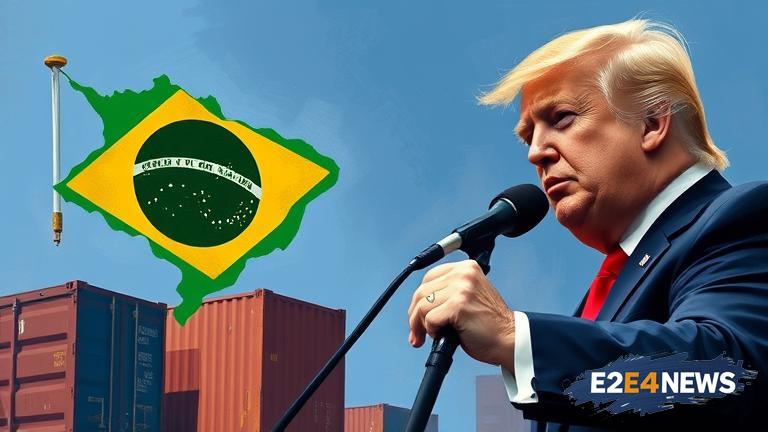President Trump has taken a major step in reshaping the US trade landscape by signing executive orders aimed at closing the de minimis loophole globally and increasing tariffs on Brazil to 50%. The de minimis loophole, which allowed for the duty-free importation of goods valued below a certain threshold, has been exploited by countries to circumvent trade rules. By closing this loophole, the US aims to level the playing field and protect American businesses from unfair trade practices. The move is expected to have far-reaching implications for global trade, with many countries likely to feel the effects. Brazil, in particular, will face significant tariffs, which could impact its economy and trade relationships with the US. The 50% tariffs on Brazil are a substantial increase from previous levels and are likely to affect a wide range of industries, including agriculture, manufacturing, and services. The US has been critical of Brazil’s trade practices, citing concerns over unfair subsidies and trade barriers. The new tariffs are intended to pressure Brazil into reforming its trade policies and complying with international trade rules. The move has been welcomed by some US industries, which have long complained about unfair trade practices by Brazil. However, others have expressed concerns about the potential impact on US consumers and businesses that rely on Brazilian imports. The global trade community is watching the situation closely, with many countries waiting to see how the US will enforce the new rules and how Brazil will respond. The US has made it clear that it will take a tough stance on trade, and the move is seen as a significant escalation of its trade policy. The de minimis loophole has been a long-standing issue in international trade, with many countries exploiting the loophole to avoid paying duties on imports. The US has been working to close the loophole for several years, and the new executive orders mark a major breakthrough in this effort. The move is also seen as a victory for US businesses, which have long argued that the de minimis loophole has been used to undercut them. The increased tariffs on Brazil are likely to have a significant impact on the country’s economy, with many industries facing substantial losses. The Brazilian government has already expressed concerns about the move, and it is likely to respond with its own trade measures. The US and Brazil have a long and complex trade relationship, with many areas of cooperation and conflict. The new tariffs and the closure of the de minimis loophole are likely to add to the tensions between the two countries. Despite the challenges, the US is committed to enforcing its trade rules and protecting its businesses. The move is seen as a key part of the US trade strategy, which aims to promote fair trade and level the playing field for American businesses. The global trade landscape is likely to be significantly impacted by the move, with many countries reassessing their trade relationships with the US. The US is also likely to face challenges from other countries, which may retaliate against the new tariffs and trade rules. However, the US is confident that its approach will ultimately lead to a more balanced and fair trade environment. The move has been welcomed by some trade experts, who argue that it is a necessary step to address the unfair trade practices of countries like Brazil. Others have expressed concerns about the potential impact on global trade and the economy. As the situation continues to unfold, one thing is clear: the US is committed to taking a tough stance on trade, and the closure of the de minimis loophole and the increased tariffs on Brazil are just the beginning.
